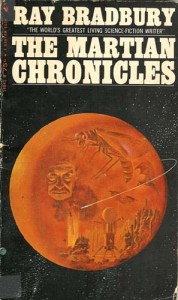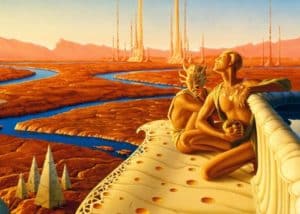In The Martial Chronicles, Ray Bradbury provides a glimpse into the future that not only looks at people from a technological  standpoint, but from a human one as well. His well crafted, almost poetic stories are science fiction in setting only. They put much more emphasis on the apathy and inhumanity of modern society, rather than the technology. (Bryfonski, 68) Ray Douglas Bradbury was born on August 22, 1920 to Leonard Spaulding and Ester Bradbury in Waukegan, Illinois. He began his writing at the young age of twelve, mostly for his own amusement. His fantastic style of writing was developed during this time as he read the Oz books, Alice in Wonderland, Tarzan, Grimms’ Fairy Tales, and the works of Poe. In 1934 his family moved to Los Angeles, where Bradbury attended high school and joined the Los Angeles Science-Fantasy Society. While a member, Bradbury published four issues of his own magazine, Futuria Fantasia. After graduating from high school in 1938 he took various jobs which allowed him to devote much of his time to writing. His first story, published in 1940 by Script magazine, was “It’s Not the Heat, It’s the Hu” and established Bradbury’s popular theme of social irritation. By 1942, Bradbury was able to earn enough money writing that he could give up his job selling newspapers and devote all of his time to what he loved. (Candee 88) As some critics would agree, the term “science-fiction” does not apply to Bradbury’s work. Most of his stories are more along the lines of fantasy with an intense understanding of human nature. In “The Green Morning”, a man named Benjamin Driscoll arrives on Mars looking for a job and a way to fit in. Before long, however, he faints, as many people do, because of the thin air of Mars. Upon waking, the first thing he notices the lack of trees on the Martian plains. He decides that his job should be to plant trees. He works for weeks planting trees of all kinds across the Martian countryside but the lack of rain leads him to believe that all of his efforts are in vain.
standpoint, but from a human one as well. His well crafted, almost poetic stories are science fiction in setting only. They put much more emphasis on the apathy and inhumanity of modern society, rather than the technology. (Bryfonski, 68) Ray Douglas Bradbury was born on August 22, 1920 to Leonard Spaulding and Ester Bradbury in Waukegan, Illinois. He began his writing at the young age of twelve, mostly for his own amusement. His fantastic style of writing was developed during this time as he read the Oz books, Alice in Wonderland, Tarzan, Grimms’ Fairy Tales, and the works of Poe. In 1934 his family moved to Los Angeles, where Bradbury attended high school and joined the Los Angeles Science-Fantasy Society. While a member, Bradbury published four issues of his own magazine, Futuria Fantasia. After graduating from high school in 1938 he took various jobs which allowed him to devote much of his time to writing. His first story, published in 1940 by Script magazine, was “It’s Not the Heat, It’s the Hu” and established Bradbury’s popular theme of social irritation. By 1942, Bradbury was able to earn enough money writing that he could give up his job selling newspapers and devote all of his time to what he loved. (Candee 88) As some critics would agree, the term “science-fiction” does not apply to Bradbury’s work. Most of his stories are more along the lines of fantasy with an intense understanding of human nature. In “The Green Morning”, a man named Benjamin Driscoll arrives on Mars looking for a job and a way to fit in. Before long, however, he faints, as many people do, because of the thin air of Mars. Upon waking, the first thing he notices the lack of trees on the Martian plains. He decides that his job should be to plant trees. He works for weeks planting trees of all kinds across the Martian countryside but the lack of rain leads him to believe that all of his efforts are in vain.
That night the rains come, and when Driscoll awakens the next morning, he finds a Mars covered with trees over six feet tall, “nourished by alien and magical soil”(Bradbury 77), and producing a “mountain river”(Bradbury 77) of new air. As Bradbury says, “Science fiction is really sociological studies of the future, things that the writer believes are going to happen by putting two and two together…Fantasy fiction is the improbable” (Candee 88). Quite obviously, that story is not very probable and should not be classified as science-fiction. Another example of such an improbable story lies in the chapter entitled “YLLA”. Bradbury goes to great lengths in this chapter to describe the Martian setting using fantastic imagery such as crystal pillar houses, golden fruits growing from the walls, and Martians with light brown skin and golden eyes. At one point he even mentions the “flame birds” that the Martians use for transportation. Even the Martian names in his stories are unbelievable. He uses names such as Mr. K, Mr. X-x-x, Mr Iii, etc and doesn’t even bother making them realistic. But for Bradbury’s “purposes the trappings of science fiction are sufficient–mere stage settings” (Riley 43). He uses his sci-fi/fantasy settings as a medium to express human behaviors and shortcomings. In the stories of The Martian Chronically, Bradbury is never hesitant to criticize mankind and our “misapplication of science to avaricious ends” (Bryfonski 68). In the chapter called “-And the Moon be Still as Bright”, Bradbury details the arrival of the fourth expedition of men from earth and their discovery of a dead planet as a result of diseases transmitted from previous expeditions. A man named Spender was the sole voice of opposition against all of the disrespect shown by his crew members toward the once noble race of Martians. While many of the men are getting drunk and partying, Spender is grieving and appealing to his captain, who can do nothing. Spender is pushed over the edge when a drunken named Biggs gets sick in the middle of one of the most beautiful cities of Mars. Spender is so offended that he disappears into the Martian hills and does not return for two weeks. When he does return, he goes on a murderous rampage, first killing Biggs, and then four of his fellow crew members. Through Spender, Bradbury is showing his disapproval of mankind’s exploit of other races by the misapplication of technology. (Bryfonski 68) Another important aspect of Bradbury’s work in The Martian Chronicles is his demonstration of human’s “inability to forget, or at least resist, the past” (Bryfonski 70).
When the second expedition of Earthmen arrive on Mars, Captain Williams, its arrogant leader, expects praise and congratulation  from the Martians and is confused when no one takes him seriously. The crew walks from door to door looking for someone who will acknowledge their accomplishment, but no one even seems to care. The men can’t “accept the fact that this is Mars-a different, unique new land in which they must be ready to make personal adjustments”(Bryfonski 70) until after it is too late to do anything about it. They are thought to be insane Martians, who have the ability to project their thoughts, thus explaining their appearance. The only cure, as they are told, for such insanity, is death. Shortly after, each crew member is executed. Their executer’s demise is also brought about by an inability to forget the past. He is the administrator of an insane asylum in which the men are placed. His job is to evaluate and, if necessary, kill insane Martians. After he kills the Earthmen, he expects their bodies to return to the “normal” Martian form. When they do not, he is convinced that he has become insane and precedes to kill himself as well. Another story with incidents of human inability to change lies in chapter “The Earth Men”, which, in some ways, “acts as a metaphor for the book as a whole”(Bryfonski 70). Here, a third expedition of Earthmen arrives on Mars, only to find a town not unlike one in the United States in the mid-1800. Upon exiting their ship they were even more surprised to find people, old friends and relatives, which had been dead for years on Earth. They are told that this is the place where people come when they die, and before long the entire crew abandoned their ship and reminisces with people from their past. That night all of the crew members settle in with their long lost families, and just a little too late, Captain John Black realizes their fatal mistake. The Martians, endowed with the gift of telepathy, create an elaborate illusion to fool the humans into vacating their ship and leaving them defenseless. As the crew lies silently in bed, they are murdered by the Martians, thus ending the third expedition. Although Bradbury’s style of writing cannot be considered science fiction, it is a very unique and an important part of modern literature. His stories in The Martian Chronicles established him as a serious writer of science fiction and fantasy and are full of wonderful images, messages, and truths about life (Solomon). “Bradbury’s stories are not an escape from reality; they are windows looking upon enduring reality” (Bryfonski 69).
from the Martians and is confused when no one takes him seriously. The crew walks from door to door looking for someone who will acknowledge their accomplishment, but no one even seems to care. The men can’t “accept the fact that this is Mars-a different, unique new land in which they must be ready to make personal adjustments”(Bryfonski 70) until after it is too late to do anything about it. They are thought to be insane Martians, who have the ability to project their thoughts, thus explaining their appearance. The only cure, as they are told, for such insanity, is death. Shortly after, each crew member is executed. Their executer’s demise is also brought about by an inability to forget the past. He is the administrator of an insane asylum in which the men are placed. His job is to evaluate and, if necessary, kill insane Martians. After he kills the Earthmen, he expects their bodies to return to the “normal” Martian form. When they do not, he is convinced that he has become insane and precedes to kill himself as well. Another story with incidents of human inability to change lies in chapter “The Earth Men”, which, in some ways, “acts as a metaphor for the book as a whole”(Bryfonski 70). Here, a third expedition of Earthmen arrives on Mars, only to find a town not unlike one in the United States in the mid-1800. Upon exiting their ship they were even more surprised to find people, old friends and relatives, which had been dead for years on Earth. They are told that this is the place where people come when they die, and before long the entire crew abandoned their ship and reminisces with people from their past. That night all of the crew members settle in with their long lost families, and just a little too late, Captain John Black realizes their fatal mistake. The Martians, endowed with the gift of telepathy, create an elaborate illusion to fool the humans into vacating their ship and leaving them defenseless. As the crew lies silently in bed, they are murdered by the Martians, thus ending the third expedition. Although Bradbury’s style of writing cannot be considered science fiction, it is a very unique and an important part of modern literature. His stories in The Martian Chronicles established him as a serious writer of science fiction and fantasy and are full of wonderful images, messages, and truths about life (Solomon). “Bradbury’s stories are not an escape from reality; they are windows looking upon enduring reality” (Bryfonski 69).
